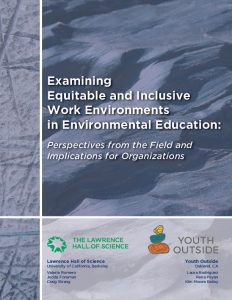The environmental education field is going through a period of reflection and reexamination in an attempt to overcome decades of practices that have resulted in a nearly homogenous white workforce. This study, led by the Research Group at the Lawrence Hall of Science, was commissioned as part of a planning grant, funded by the Pisces Foundation, to support the design of a professional learning workshop series for outdoor science organizations. Through focus groups with educators of color and a survey of organization leaders, this study sought to better understand how environmental education organizations think about and operationalize equity and inclusion in the work environment. While we acknowledge the many dimensions of diversity and intersectional identities, this study specifically focused on the experiences of environmental educators of color.
The findings presented resonate with much of the research and literature in the field, and continue to highlight how imperative it is that environmental education organizations examine their practices regarding equity and inclusion to ensure that they are being intentional and responsive to the experiences of their staff of color. By presenting these findings, we hope to increase the degree to which organization leaders and white-identifying staff can begin to gain a deeper understanding of the lived experiences of educators of color and can reconcile the ways in which they have been thinking about and operationalizing equity and inclusion in their organizations. We believe that it is critical for all staff, including organization leaders and educators of color, to engage in ongoing dialogue as a means to understand and empathize with each other’s perspectives and lived experiences. Finally, we hope that increased understanding and empathy will encourage a culture of productive reflection and action among outdoor science programs and their leadership.
Acknowledgements
Lawrence Hall of Science offers thanks to our co-authors and partner organizations for support and critical perspectives throughout this study. Co-authors Laura Rodriguez, Rena Payan, and Kim Moore Bailey, all from Youth Outside, were critical thought partners through the design and execution of this study to ensure that the methods, instruments, and communication of findings utilized an asset-based approach and minimized potential emotional harm or trauma to study participants. In addition, this report would not have been possible without input and invaluable perspective from: Eric Aaholm of YES Nature to Neighborhood; José González, founder of Latino Outdoors; Charity Maybury, Cristy Rocca, and Francis Taroc, from Crissy Field Center at the Golden Gate National Parks Conservancy. Each of these individuals offered careful consideration of the evaluation tools as well as suggestions about how best to communicate the resulting findings.
Lead funding for this study provided by the Pisces Foundation. Additional funding was provided by the Clarence E. Heller Foundation.

